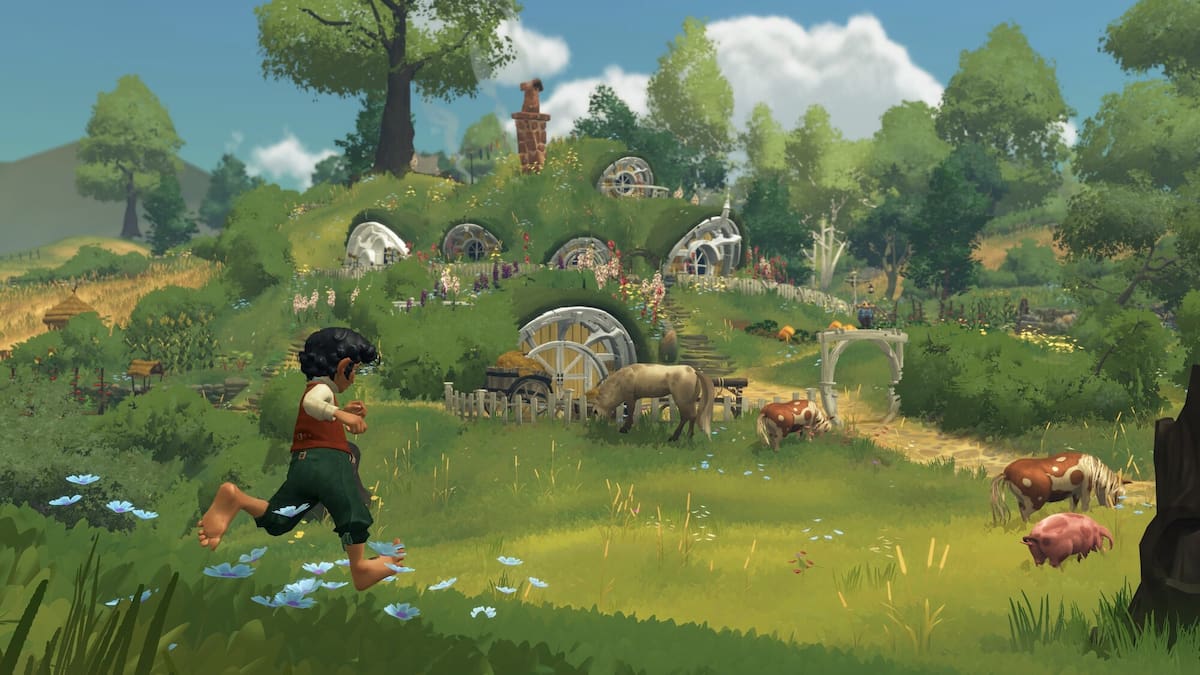Tales of the Shire was conceived in late 2020, Wilks says.
Pandemic lockdowns led to a boom in so-called “cosy” games, many based around building a simple farm, that provided relaxation and respite from real life.
“At the time, it was described as a game the world needs right now, which is probably still true,” Wilks says.
“It’s very much aimed at the cosy audience.”
A number of reviewers were given an early look. One of the largest, IGN, with 19.2 million followers on YouTube, was brutal (see clip below), with the website calling it “a promising idea that turned out dreadfully boring and extremely buggy”.
“Which Tolkien nerd among us hasn’t daydreamed about living a relaxing life as a halfling?” IGN reviewer Travis Northup wrote.
“But instead of the warmth and comfort of the Shire, I spent 25 hours feeling like I was marching through the Dead Marshes in this cosy misadventure.
“It’s regrettably dull from start to finish, and runs so badly I wasn’t even allowed to be bored out of my mind in peace.
“The bare bones life sim mechanics offer some of the most shallow versions of classic activities like fishing and farming that we’ve seen done much better in dozens of other games, and building social links with the inhabitants of Bywater is monotonous, repetitive, and never worth the effort.”
Wētā Workshop game studio director Tony Lawrence says there have been good reviews, too.
Indie Informer called Tales’ world “a joy to exist in”.
Aggregator Metacritic (the Rotten Tomatoes of gaming) gives Tales 60 out of 100 overall, based on the reviews of 15 critics (user reviews will follow after today’s release).
“We’ve opened it up to the community for the past three days,” says Lawrence.
“Some people have had early access to the game and their response has been very positive.
“It’s got what they want, which is a relaxing game set in the Lord of the Rings lore, where they can sit and be their best hobbit and explore and decorate to their hearts’ content.”

But even some of the good reviews noted bugs.
“We have a first-day patch arriving tomorrow that will address many of the issues that have been brought up,” Lawrence told the Herald the day before the game’s official release.
“We spent a lot of time getting to a point where we’re very comfortable. But over the next couple of months, as you do when a game is released into the wild, we’ll keep on improving based on feedback.”
Game over for nine staff
Wilks confirms industry chatter that nine staff were laid off from Wētā Workshop’s game studio last October, leaving around 30 working on Tales of the Shire.
“Look, when you’re making games, you do have ups and downs in terms of the head count. We were at the end of our production period and we didn’t require as many people.”
Lawrence expects staff numbers to increase again as Wētā Workshop ramps up development on its next game, which is said to be more front-foot like Diabolo (an action role-playing game). Wētā isn’t sharing details at this point.
‘Crunch culture’ allegations
A July 27 article by US tech publication The Verge carried allegations of “crunch culture” at Wētā Workshop.
“There is nothing indicating Wētā Workshop acted illegally, but staff who spoke to The Verge said there were definitely crunch periods during the development of Tales of the Shire. One staff member said they could not remember a time when they were not working beyond 50 hours a week,” it said.
The video game industry – particularly in the US – is notorious for pushing staff to work long hours.

“Among video game developers, it’s called ‘crunch’: a sudden spike in work hours, as many as 20 a day, that can last for days or weeks on end,” the New York Times said in a general report on the sector.
“During this time, they sleep at work, limit bathroom breaks and cut out anything that pulls their attention away from their screens, including family and even food. Crunch makes the industry roll – but it’s taking a serious toll on its workers.”
At one of the industry’s largest game developers, “crunch” could involve staff working 12 to 14-hour shifts per day, the Times reported, implying a five-day week of up to 70 hours.

Complaining about 50 hours per week might make some in the US game sector – and its tech and business sector in general – snort in derision, but Wētā Workshop tamps down even that figure.
“There was no ‘crunch’ during the development of Tales of the Shire,” Wētā Workshop chief marketing officer Jessica Wallace told The Verge. “We extended deadlines to prioritise the wellbeing of our team, and all staff worked under New Zealand employment agreements, which ensure fair and adequate compensation for all hours worked.”
The newly paywalled US publication said there was a culture shift after studio director Amie Wolken quit Wētā in November 2023 to take a position as CEO at Dinosaur Polo Club, a New Zealand indie studio (Wolken told the Herald she had no comment) and Lawrence was hired in her place six months later.
“I’ve never seen crunch in my time here,” Lawrence told the Herald.
“Every now and again, certainly as with any job and certainly when you’re close to a deadline, hours might increase somewhat. But I wouldn’t say it’s outlandish.
“What I would say – and I’ve been working in games for nearly 20 years now – is that crunch is usually mandated, as in someone like me will say, ‘We’re working 10 to 12 hours, five to seven days a week’. It’s never happened here, ever, and it’s not going to.”
Wētā Workshop, best known for its costumes and props, is owned and independently run by Sir Richard Taylor and Tania Rodger while WētāFX is majority-owned by Sir Peter Jackson and Dame Francis Walsh.
The pair sold Wētā Digital’s technology to US gaming and film software firm Unity in 2021 for $2.2 billion, only to rehire 265 engineers to WētāFX after Unity hit problems in late 2023.
Wētā Workshop had a previous foray into gaming through an alliance with US firm Magic Leap, the maker of a steampunk-looking pair of virtual reality goggles that, in the mid-2010s, were seen by some as the next big thing in gaming as the start-up’s value ballooned to US$4.5 billion.
Magic Leap, now backed by Saudi money, is still chasing breakthrough success for its headgear.
But it is no longer in the entertainment market, which it exited in 2020 as it laid off 1000 staff worldwide, including 15 at Wētā Workshop Interactive, its joint venture with Wētā Workshop.
The culled staff formed a start-up, which was in turn bought by Pokemon Go maker Niantic.
Tales of the Shire is being published (marketed and distributed) by US firm Private Division, which is connected to Middle-earth Enterprises, the company that owns the intellectual property rights for J.R.R. Tolkien’s works.
Wētā Workshop won’t say how much the Tales of the Shire cost to develop, or the clip of the ticket that Private Division will take on sales.
The single-player only Tales of the Shire: A The Lord of The Rings Game is available from 4am today for PC (via Steam), Nintendo Switch, PlayStation 5 and Xbox Series X|S. Pricing varies by platform. The Switch version is $89.99.
Chris Keall is an Auckland-based member of the Herald’s business team. He joined the Herald in 2018 and is the technology editor and a senior business writer.






